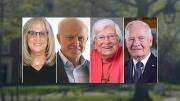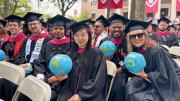The Faculty of Arts and Sciences (FAS) faces interesting challenges in maintaining expertise in current fields of knowledge, bringing in professors to pursue new frontiers, training future scholars, and educating undergraduates. As FAS dean Michael D. Smith illustrated with these figures, adapted from his annual report dated May 2008, social sciences (economics, government, history, and so on) attract the largest number of College concentrators, and account for the largest faculty cohort. Arts and humanities professors rank second, but the number of concentrators (not the only students taking courses, to be sure), is much smaller, and diminishing. Graduate-student enrollments (importantly, the source of teaching fellows) are largest in the sciences, but fastest-growing in engineering and applied sciences—the only group within the faculty to expand in relative size during the past decade (see “A ‘Pause’ and Progress in FAS,” July-August, page 68).









